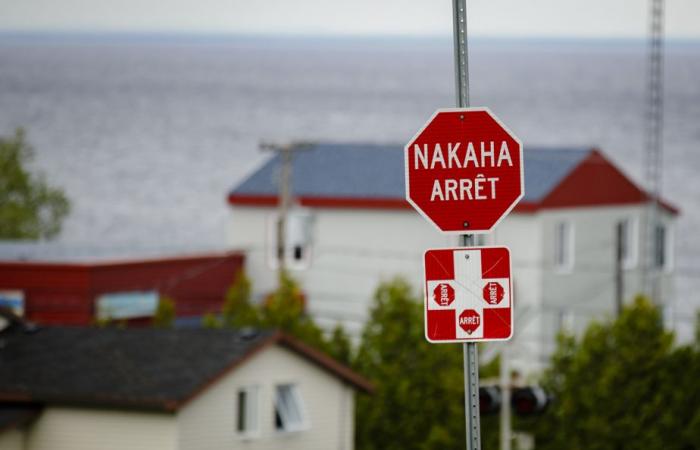Quebec is rejected by the Supreme Court and will have to pay a little more than $767,000 to the Mashteuiatsh band council to make up the accumulated deficit of its police service.
Posted at 11:59 a.m.
Pierre Saint-Arnaud
The Canadian Press
The highest court put an end to the debate between the Quebec government and the band council on Wednesday by confirming a decision rendered in December 2022 by the Quebec Court of Appeal. This overturned a decision rendered three years earlier, in December 2019, by Judge Robert Dufresne of the Superior Court, who instead ruled in favor of Quebec and Ottawa, finding that the two governments had respected their contract.
The Court of Appeal, on the contrary, considered that the question went beyond the simple contract and called into question the good faith of the governments in the management of the tripartite agreement between Ottawa, Quebec and the band council. She thus ordered Ottawa to pay nearly $833,000 and Quebec a little more than $767,000, which represents their respective shares of 52% and 48% of financing of the agreement.
Quebec alone to contest
Ottawa agreed to pay the amount, but Quebec decided to go to the Supreme Court alone to try to overturn the decision.
The highest court rules, eight votes to one, in favor of Pekuakamiulnuatsh Takuhikan, the band council which represents the Pekuakamiulnuatsh First Nation in Mashteuiatsh, an Innu community located on the west shore of Lake Saint-Jean, near Roberval. The Supreme Court thus agrees with the Court of Appeal which ruled that beyond contractual law, “the refusal of these governments to finance Mashteuiatsh Public Security (SPM) allows us to conclude both a violation of the principle of good faith and non-respect of the honor of the Crown.
The SPM had accumulated deficits year after year between 2013 and 2017, totaling almost 1.6 million due to insufficient government funding. The band council took the case to court, relying on both private contractual law and public law, anchored in the principles of Aboriginal law. The band council maintained that Canada and Quebec had refused to truly negotiate the financial clauses of the agreements, which would constitute a breach both of the requirements of good faith and of the obligations, even more onerous for the State, arising from the honor of the Crown.
Costly arbitration award
This deficit was mainly attributable to an arbitration award rendered in July 2014 which granted the Mashteuiatsh police officers a retroactive increase as of 1is April 2009, an unexpected bill of $853,000 which continued to swell subsequently due to unforeseen salary increases awarded by the arbitrator.
The court considers that “the award of damages equivalent to the accumulated deficits is an appropriate measure which will allow the contracting parties to approach the next negotiations calmly”.
In its decision written by Justice Nicholas Kasirer, the Supreme Court considers that “Quebec’s refusal to renegotiate its financial contribution during the renewal of the agreements was not consistent with the principle of good faith, a source of private law obligations set forth to (article 1375 of the Civil Code of Quebec) which governs the conduct of the parties during the execution of a contract. It also constituted a breach of the obligation to act in accordance with the honor of the Crown, falling under public law, which was imposed on Quebec in the execution of tripartite agreements.”
“Intransigence and unreasonable behavior”
“By adopting a posture of intransigence through its refusal to negotiate, Quebec acted contrary to what the agreements stipulated […] This behavior was unreasonable in that it violated the legitimate expectations of Pekuakamiulnuatsh Takuhikan and undermined the contractual objective of the parties, namely the maintenance of the SPM,” writes Judge Kasirer.
PHOTO OLIVIER JEAN, LA PRESSE ARCHIVES
Mashteuiatsh
As for the question of the honor of the Crown, the magistrate underlines that this principle “constitutes such a rule of public law which can, in certain contexts, broaden the scope of state responsibility”.
“Since the tripartite agreements contemplated the renegotiation of their financial clauses, the honor of the Crown imposed on it the obligation to behave honorably during the renewal negotiations. Quebec has not respected this obligation. Through his intransigent attitude, he dishonored himself by refusing to negotiate the financial conditions of tripartite agreements. Quebec refused to consider Pekuakamiulnuatsh Takuhikan’s repeated requests to renegotiate the level of funding for its police force, even though it knew that the SPM was underfunded and that Pekuakamiulnuatsh Takuhikan would accept an insufficient level of funding to avoid have recourse to the unsuitable services of the Sûreté du Québec. This conduct represents a breach of the obligation to execute tripartite agreements with honor and integrity […] Quebec conducted itself in a manner that fell well below the standard that characterizes honorable conduct,” ruled Judge Kasirer.
“The relationship between the parties was undermined by Quebec’s intransigent attitude at the stage of renewing tripartite agreements. This attitude benefited him and harmed Pekuakamiulnuatsh Takuhikan, not only financially, but also in terms of the quality of police service. »
Cautious Quebec
In Quebec, the minister responsible for Relations with First Nations and Inuit, Ian Lafrenière, did not want to react immediately to the severity of the judgment handed down by the highest court, explaining that the decision was too recent. “We have just seen it, I understand it very, very well. This is an issue that I am following closely with my colleague who is in public security, my colleague in justice. »
“When we talk about public security, you know, it’s an issue that is extremely important to me, but here, I want to see what the position will be [du ministre de la] Justice in that, because it’s really a judgment that has just fallen,” the minister simply said.
Dissent
The only dissenter from the decision, Judge Suzanne Côté considers on the contrary that “the principle of good faith and that of the honor of the Crown do not allow a court to set aside or ignore certain express clauses of a contract and to impose obligations which are inconsistent with their unambiguous terms.”
According to her, “the agreements limit in express terms the contribution of governments to a maximum amount determined each year […] Furthermore, at the end of the agreements, Pekuakamiulnuatsh Takuhikan is responsible for deficits incurred beyond the financial contribution that the governments wish to offer and the governments are not responsible for the commitments made by Pekuakamiulnuatsh Takuhikan. »
She recalls that “the government parties have not committed to assuming all of the costs related to the creation and maintenance of a police service capable of ensuring the same level of service as that enjoyed by surrounding communities. Such an obligation is not found anywhere in the wording of the agreements.”
“The principle of the honor of the Crown, according to her, does not allow the clauses of the tripartite agreements to be rewritten to introduce an obligation for Quebec to assume all of the costs linked to the creation and maintenance of the SPM . »
Contrary to the majority opinion, she considers that “Quebec has fulfilled all its commitments and has not abused any rights provided for in the contract, including with regard to the renewal of tripartite agreements. It was not unreasonable for Quebec to rely on the letter of the agreements concerning responsibility for accumulated deficits.”







